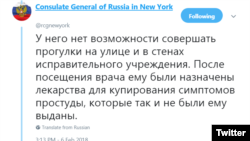On Tuesday, February 8, the Kremlin-run media outlets Sputnik TV and TASS reported that cyber hacker Pyotr (Peter) Levashov, a Russian citizen, was the victim of “cruel” treatment in a state prison in Connecticut where he was being detained by the U.S. Marshal Service on eight counts of cybercrime charges in an FBI case.
The media reports said Russia had called the United States to “ensure Levashov’s rights are not violated.”
Alexey Topolsky, deputy envoy at the Russian Consulate in New York, told Polygraph.info that Levashov was experiencing “cruel treatment” in a state prison in Bridgeport, Connecticut, that consular officials asked prison management for “compliance with his lawful rights and interests.” He said the Consulate will fight to ensure that the conditions of Levashov’s incarceration are “not worse than of other inmates.”
“He was in a single confinement cell with a tiny window – well, hardly any window, no towel, no pillow or blanket, but a thin single mattress. With a lot of noise coming from the cells nearby, Levashov was sleep-deprived and looked bone-tired. He wasn’t allowed to shower, or time for a walk in the prison yard,” Topolsky added.
“Levashov was isolated to be reviewed and evaluated for protective custody,” Karen Martucci, the acting director of external affairs for the Connecticut Department of Corrections, told Polygraph.info. Martucci and a U.S. Marshal Service official confirmed that Levashov initially was placed in protective custody for his own safety while he was being evaluated, which they say is a typical procedure.
Deputy Brian Taylor of the Marshal Service denied Levashov was in solitary confinement.
Levashov arrived in the U.S. on February 2, after he was extradited from Spain. The U.S. Justice Department and media reports indicate he is accused of running a botnet that took over 100,000 devices that then distributed viruses, ransomware and phishing e-mails.
“The reports in the (Russian) media are not matching up,” Martucci added, referring to the reports on Levashov’s incarceration conditions.
According to the Russian officials, Levashov was prescribed medication for a cold but never received it. Martucci disputes that claim, referring to U.S. privacy laws that prevent her from commenting on an inmate’s medical conditions. Topolsky claimed that Levashov was not provided with proper bedding or allowed to shower.
“His basic needs were met,” said Martucci.
Levashov was first placed in the state prison in Bridgeport, where the Russian consulate officials visited him on February 6. About one day after the Russian visit and the media inquires into the situation he was moved to the state’s New Haven Correctional Center. Officials say he is now in the general prison population, not confined to a cell.
The Connecticut Department of Corrections press officer said she was not aware of the reasons behind Levashov’s transfer to New Haven, however, mentioned, that they were not certain whether he will stay there permanently.
“I am not certain,” said Karen Martucci, spokesperson for the Connecticut Department of Corrections, “but if he were to be moved again, it would be driven by need.” The Bridgeport and the New Haven correction centers are identical “intake” facilities that house pre-trial suspects without bond.
In a follow up statement on its Russian Twitter feed, the Russian consulate took credit for “better conditions,” although state prison officials are unclear that was the reason for any changes.
A 1990 U.S. Department of Justice study of the management of protective custody in American prisons found that the top reasons for placing inmates in single cells for protective custody were that they were gang members, institutional informants or notorious criminals.
Although the study is more than two decades old, it seemed to confirm some of the Russian claims regarding Levashov’s “protective custody,” particularly the size of his cell. The average size of a single cell in protective custody, according to the study, was 70 square feet or about 2.5 square meters. Consular officials said he was in a two-meter-square cell.
That study also found that only 53% of single occupancy cells had outside windows, 73% of cells had toilets and 43% had lighting controlled by the inmate.
While TASS and Sputnik reported the Russian Consulate sent a note to the U.S. State and Justice departments, Topolsky said he only communicated with Connecticut officials. He said Sputnik did not seek comment but only published information taken from other media sites.
“We did not send a note to the Department of Justice,” Topolsky told Polygraph.info. “We sent a request to the management of the correctional facility.”









![General Consulate of Russia in New York posted on Twitter on February 6 about Levashov: "During the meeting with the prison management in Bridgeport (CT) we focused on the immediate need to improve his [Levashov's] incarceration conditions and compliance with his rights. The situation is under our control, we're in contact with the law enforcement and the Department of State."](https://gdb.voanews.com/79781A00-C717-4716-9A6C-9804C6196457_w250_r1_s.png)


